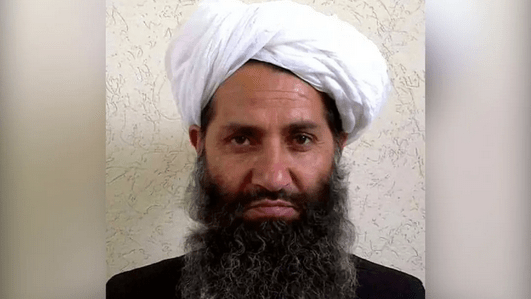
Who is the Taliban’s reclusive supreme leader Hibatullah Akhundzada?
In the days since taking power in Afghanistan, a wide range of Taliban figures have entered Kabul – hardened commandos, armed madrasa students and greying leaders back from years of exile.
The group’s deputy leader, Mullah Abdul Ghani Baradar, has been in Afghanistan since shortly after the Taliban’s surprise takeover of the country, in an offensive that ousted a Western-backed government and put plans by the US and its allies to evacuate citizens and Afghans seeking safety into disarray.
There has been one major exception – the group’s reclusive supreme leader.
But Hibatullah Akhundzada may finally make a public appearance – and soon – the Taliban said on Sunday. “He is present in Kandahar,” Taliban spokesman Zabihullah Mujahid said.
Hibatullah – the so-called commander of the faithful – has shepherded the Taliban as its chief since 2016 when snatched from relative obscurity to oversee a movement in crisis.
After taking the insurgency’s reins, the cleric was tasked with the mammoth challenge of unifying a jihadist movement that briefly fractured during a bitter power struggle.
The infighting came as the group was hit with successive blows – the assassination of Hibatullah’s predecessor and the revelation that its leaders had hidden the death of Taliban founder Mullah Omar.
Little is still known about Hibatullah’s day-to-day role, with his public profile largely limited to the release of annual messages during Islamic holidays.
The Taliban have released just one photograph of the leader.
The announcement that Hibatullah will soon appear in public comes as the heads of the group’s various factions openly preached in Kabul’s mosques, met with opposition figures, and even chatted with Afghan cricket officials in recent days.
The Taliban have a long history of keeping their top leader in the shadows.
The group’s enigmatic founder Mullah Mohammad Omar was notorious for his hermit ways and rarely travelled to Kabul when the Taliban were in power in the 1990s.
Instead, Mullah Omar remained largely out of sight, reluctant to even meet visiting delegations.
He stayed in his compound in Kandahar, the birthplace of the militant movement and the centre of its iron-fisted government in the 1990s.
Still, Omar’s word was rule and no singular figure has emerged to command the movement with the same respect.
Source: SCMP





